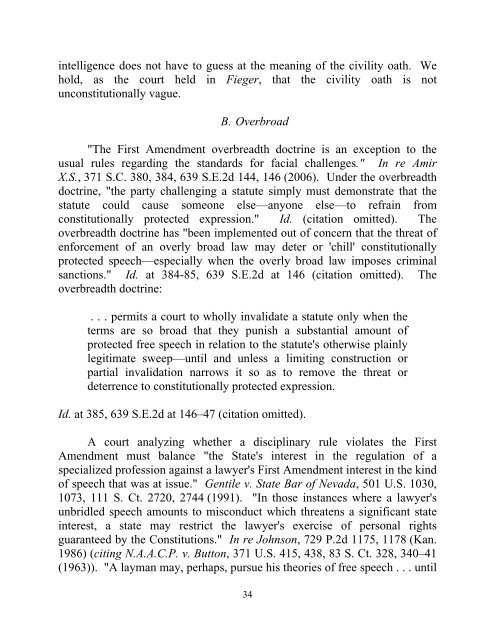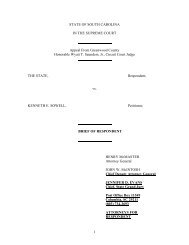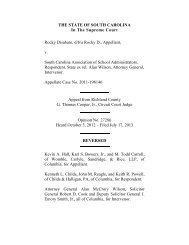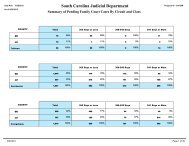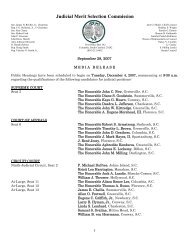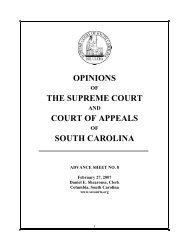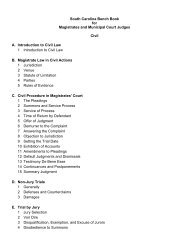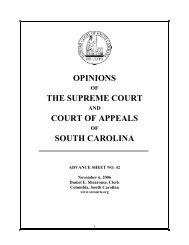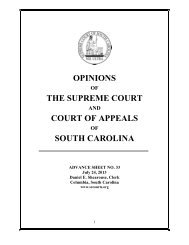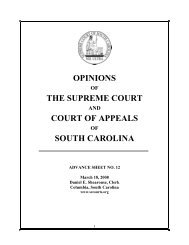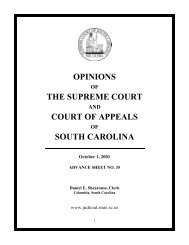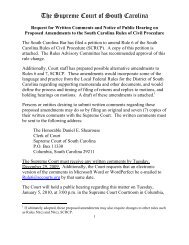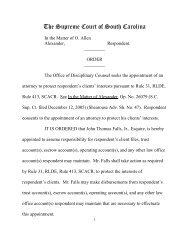The Supreme Court of South Carolina - SC Judicial Department
The Supreme Court of South Carolina - SC Judicial Department
The Supreme Court of South Carolina - SC Judicial Department
Create successful ePaper yourself
Turn your PDF publications into a flip-book with our unique Google optimized e-Paper software.
intelligence does not have to guess at the meaning <strong>of</strong> the civility oath. We<br />
hold, as the court held in Fieger, that the civility oath is not<br />
unconstitutionally vague.<br />
B. Overbroad<br />
"<strong>The</strong> First Amendment overbreadth doctrine is an exception to the<br />
usual rules regarding the standards for facial challenges." In re Amir<br />
X.S., 371 S.C. 380, 384, 639 S.E.2d 144, 146 (2006). Under the overbreadth<br />
doctrine, "the party challenging a statute simply must demonstrate that the<br />
statute could cause someone else—anyone else—to refrain from<br />
constitutionally protected expression." Id. (citation omitted). <strong>The</strong><br />
overbreadth doctrine has "been implemented out <strong>of</strong> concern that the threat <strong>of</strong><br />
enforcement <strong>of</strong> an overly broad law may deter or 'chill' constitutionally<br />
protected speech—especially when the overly broad law imposes criminal<br />
sanctions." Id. at 384-85, 639 S.E.2d at 146 (citation omitted). <strong>The</strong><br />
overbreadth doctrine:<br />
. . . permits a court to wholly invalidate a statute only when the<br />
terms are so broad that they punish a substantial amount <strong>of</strong><br />
protected free speech in relation to the statute's otherwise plainly<br />
legitimate sweep—until and unless a limiting construction or<br />
partial invalidation narrows it so as to remove the threat or<br />
deterrence to constitutionally protected expression.<br />
Id. at 385, 639 S.E.2d at 146–47 (citation omitted).<br />
A court analyzing whether a disciplinary rule violates the First<br />
Amendment must balance "the State's interest in the regulation <strong>of</strong> a<br />
specialized pr<strong>of</strong>ession against a lawyer's First Amendment interest in the kind<br />
<strong>of</strong> speech that was at issue." Gentile v. State Bar <strong>of</strong> Nevada, 501 U.S. 1030,<br />
1073, 111 S. Ct. 2720, 2744 (1991). "In those instances where a lawyer's<br />
unbridled speech amounts to misconduct which threatens a significant state<br />
interest, a state may restrict the lawyer's exercise <strong>of</strong> personal rights<br />
guaranteed by the Constitutions." In re Johnson, 729 P.2d 1175, 1178 (Kan.<br />
1986) (citing N.A.A.C.P. v. Button, 371 U.S. 415, 438, 83 S. Ct. 328, 340–41<br />
(1963)). "A layman may, perhaps, pursue his theories <strong>of</strong> free speech . . . until<br />
34


